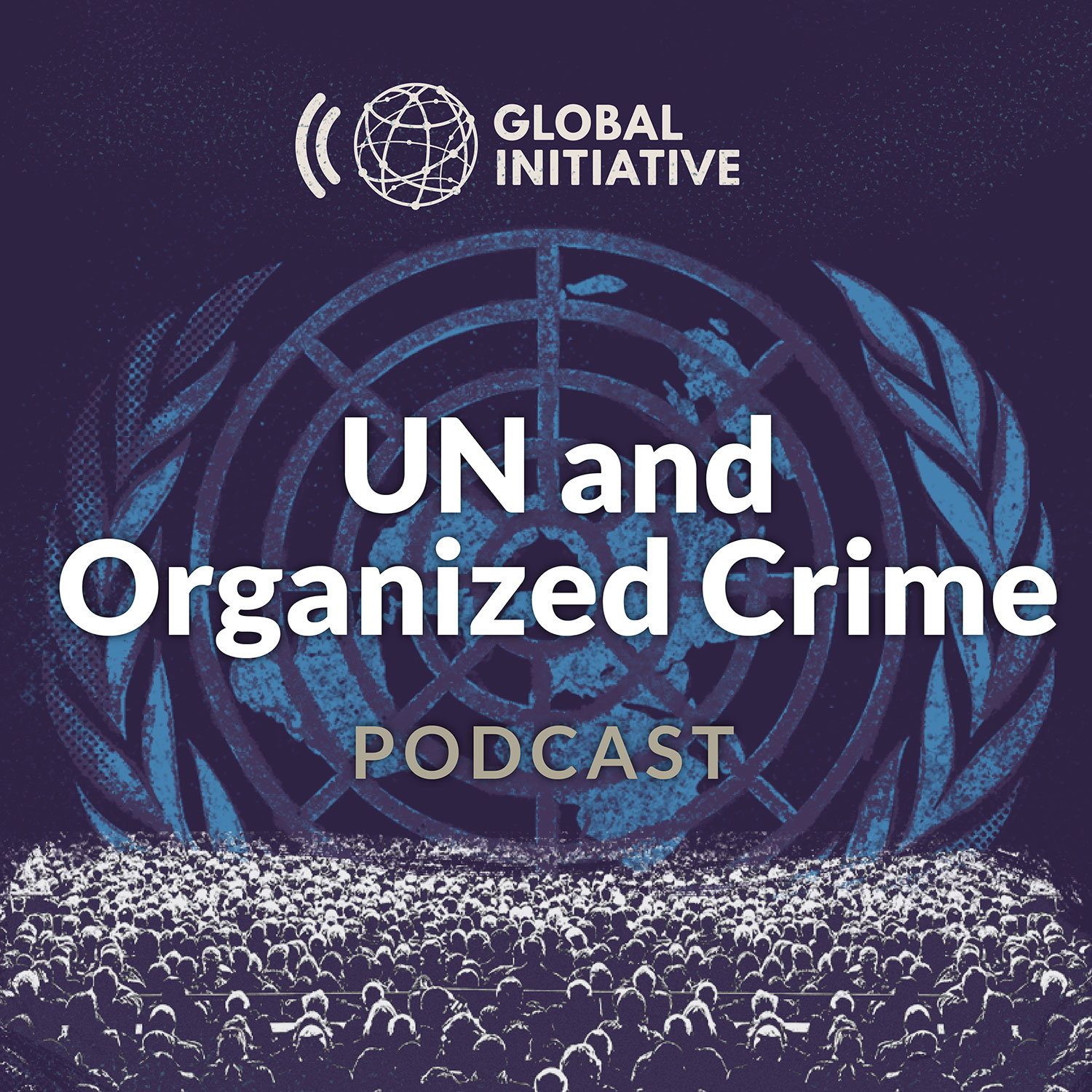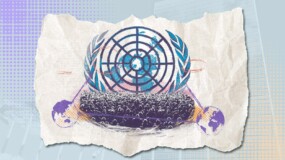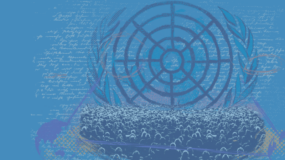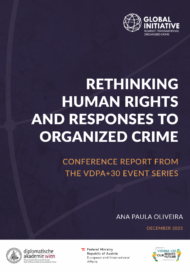Posted on 11 Sep 2024
Our latest UN and Organized Crime podcast episode explores the need for gender equality and gender sensitive policies and programmes in national and international responses to organized crime, and how these issues are approached in multilateral negotiations.
The GI-TOC’s director of multilateral engagement, Ian Tennant, spoke about these issues with Ambassador Corinne Kitsell, an experienced British multilateral diplomat, who is currently the UK’s permanent representative to several international organizations in Vienna.
This interview has been edited for length and clarity.
Ian Tennant: Ambassador, you have been a strong advocate for inclusion of gender perspectives in your work as a UN diplomat in New York, Geneva and now as ambassador in Vienna, where you were one of the first Chairs of the informal UNODC Group of Friends for Gender Equality. How have you seen gender discussions evolve and what are the current challenges for diplomats promoting gender in multilateral spaces?
Ambassador Corinne Kitsell: I started my career in the 1990s, and I think that was probably the golden age of multilateralism, although I guess we didn’t realize it at the time. After the end of the Cold War, there were a lot of things that were agreed in the UN system that I think we would struggle to agree now. And gender negotiations and work on gender featured really early on in my career, going way back to Beijing in 1995, the iconic UN Women’s Conference. I was very, very junior as part of the UK delegation to that, but it was a really inspiring experience. Actually, at that point, probably one of the only times where I found myself in an environment where most of the members of most of the delegations were women. That didn’t happen much in those days. In the early days of my career, frankly, most diplomats, and certainly most senior diplomats, were men.
But fast forward a bit, it’s worth remembering that the Sustainable Development Goals agreed by member states say that by 2030 we should be achieving gender equality and empowering all women and girls. And it’s not so many years ago that member states agreed that. But I find it really shocking that in 2024 we’re still having the conversation about gender. There are still countries that argue against gender equality, and even worse, arguing against considering whether and how issues and policies impact different women and girls. It’s surprising to me, even though there are many female ambassadors, that we’re even still having this conversation.
IT: You spoke about that golden age of multilateralism and the prominence of female diplomats in those negotiating teams. It sounds almost like there was a definite direction of travel that everybody in those negotiations was generally working towards. Is that how you would characterize it? And how does that compare to what you’ve just described as the more recent atmosphere? Is there a sense that not only is there inertia, but sometimes it feels like moving backwards?
CK: I think maybe because I was very junior, perhaps I wasn’t aware of some of the challenges at the time, but it felt like an optimistic time in the 1990s. And what we definitely see now across the UN system, across all the Vienna-based organizations, is that this isn’t just an issue for transnational organized crime, it’s a small group of countries who are working very hard to roll back language on gender equality. Here in Vienna, it has been particularly led by Iran and Russia, and they argue against language on gender equality. They would rather we didn’t mention gender. It’s a very strange experience as a female ambassador to be sat in a negotiation with male ambassadors from those countries who are arguing against gender equality in a meeting where – here in Vienna – my French, my American and other counterparts are actually female as well. But it’s galvanized us, I think, as member states here to get more organized. You mentioned the Group of Friends on gender equality that the UK and our Colombian colleagues set up jointly back in 2021, I think that was. And that was because we realized that perhaps we were being too complacent, that we thought we’d won these battles 20 or 30 years ago, but clearly we hadn’t. So we needed to get organized and essentially continue the fight.
IT: For those who are maybe not quite familiar with some of the UN terminology, can you describe very briefly what a Group of Friends does, who’s in the group, and what activities do those ambassadors and diplomats carry out together?
CK: There are many Groups of Friends across the UN system on all sorts of topics, including thematic and geographical ones. In this case, the Group of Friends is a voluntary grouping of member states that are interested in promoting gender equality, including some countries that have particular focus on gender in their foreign policies. It’s totally voluntary. We pulled this group together here in Vienna because we were fighting these battles where we were negotiating text in resolutions or declarations or other official documentation in the UNODC space, and realized that we needed to be better coordinated in terms of agreeing among ourselves what we actually were trying to achieve and then how we were going to go about that tactically. The group was formed for very practical reasons in this case. We also have an active International Gender Champions Network here in Vienna, which many ambassadors, but also heads of the Vienna-based organizations, are members of. That’s perhaps more of a forum for talking about gender issues more broadly and about things that we do in our own teams to promote gender equality or things that happen in our own foreign policy.
The Group of Friends was an effort to do something really practical, and we’re very proud of it because it has actually had an impact. One of the things that I’m particularly proud of is how we encouraged some of the smaller countries, those who perhaps don’t often have a loud voice in negotiations, to speak up more confidently and talk about the importance that they place on gender equality. And this isn’t by any means a group of Western countries either. It includes countries from all the geographical regions, which is great to see.
IT: Organized crime is also one of those spheres that’s historically been seen as a man’s space, whether it’s the mafia, organized crime groups, or whether it’s in the law enforcement response. Obviously, that’s changing from both perspectives. Why does the UK government think it’s important to ensure that the experiences of different genders are considered in efforts to prevent and combat organized crime?
CK: You’re absolutely right that when we think about things like human trafficking, drug trafficking, money laundering, or whatever transnational organized crime we might be considering, we all have biases and stereotypes, maybe which we don’t even realize. Clearly, if key decision makers, the policymakers, also have those biases, then the policies that they’re designing won’t be fair. When we’re thinking about organized crime, as you say, there’s a bit of a stereotype that men are perhaps more likely to be seen as the perpetrators and women as the victims. But that’s just a stereotype. One of the things that the UK has been really keen on is finding out what’s really going on and ensuring that we have the data that supports some of this, to avoid that really simplistic view and ensure that the policies that are designed actually work and address entire communities. That’s not to say that gender mainstreaming in this context is just about women’s issues: it’s about ensuring that we have policies and programmes that are designed to take account of gender issues, both for women and girls, and men and boys.
IT: There’s new and emerging data and evidence on not only who are the perpetrators and how to understand the dynamics of organized crime groups, including when women are involved, but also the different needs that male and female victims have. This is especially important as we run up to the Conference of Parties to the UN Convention on Transnational Organized Crime (UNTOC CoP), taking place around a month from now in October. Why do you think that this is a relevant moment to raise awareness of the importance of gender mainstreaming?
CK: An important starting point is that the UNTOC CoP only meets once every two years, so it’s an opportunity to reflect on how the world has changed in that time and how organized crime has evolved, and to renew our energy collectively as a global community to ensure that gender equality is high up on the agenda of issues. If we, as member states, don’t address this issue now, then we’re just essentially creating more trouble for ourselves further down the line. But I think there have been positive changes in the last two years, and we’d also want to reflect on those at the UNTOC CoP and have the opportunity to celebrate some success. For example, it was only last year in December that we had the first resolution on the importance of gender issues in tackling corruption. And that resolution was tabled by Ghana, which shows that this is not a Western issue. It’s something that garners support across the geographical regions.
IT: It’s been striking seeing who’s engaged in the gender debate. It’s one of those things, I think, that brings different parts of the multilateral space together. And you see different countries involved, as you say, not just Western countries. I think one of the other ways in which we ensure these gender perspectives are brought into processes like the UNTOC CoP is through ensuring that civil society perspectives are integrated into the conference. You’ve served in New York, Geneva and also in Vienna. How do you see the space for civil society engagement in Vienna, how do you think it could be improved and what priorities does the UK have to make sure that the space is open?
CK: I think we absolutely can’t underestimate the impact and importance of civil society across negotiations, across the whole of the UN system. It’s rather smug of member states or of governments to think that you can have government representatives in a room who can design policies and make decisions, and that we have all the answers and all the information without going out and engaging with those who are on the ground actually doing the work. For the UK delegation, the importance of having members of civil society as part of our delegation is bringing real evidence of what actually works on the ground. There’s a phrase that sometimes gets used, ‘nothing about us without us’. The idea that you could have policymakers talking about what might work on the ground in local communities without actually including those communities in the conversation just seems crazy to me. But of course, we understand that there are certain governments who feel, for whatever reason, that having those representatives present and having them fully involved in the conversation is somehow inappropriate.
These are things that only governments can decide. We seek to support civil society to be part of our delegation. We’ve supported civil society from other countries to be part of delegations for other countries. In some cases, coming to these meetings in Vienna, Geneva or New York is an expensive business. We devote resources to ensuring that delegations can be as inclusive as possible.
IT: I think those of us from civil society are always grateful to governments like the UK. I know the UK has been active in the Group of Friends of multi-stakeholder participation as well, making sure that the space is open, whether that’s through delegations or through the general procedures for applying to these meetings. Is there anything else you would like to add at this point before we finish?
CK: It might be worth saying that for us this goes beyond just talking in generalities about gender equality. The particularly important point on transnational organized crime has been investing in producing the Serious Organized Crime Toolkit, where the UK has provided funding to the UN Office on Drugs and Crime to design a toolkit that has been rolled out across the world. We’ve co-funded with Canada a toolkit on gender and human rights. That just sounds like we’ve produced a document or something, but it is about being able to share tools with communities, with civil society on the ground, that then promotes practical approaches to ensuring gender sensitive and human rights compliant strategies against serious organized crime. That toolkit has been rolled out across seven regions around the world, and there have been thousands of participants in workshops. It’s worth stressing that this is something for us which goes beyond just a point of principle and into trying to do something that actually has a practical impact globally.
IT: Thank you very much, Ambassador, for taking the time to join us and for all the work that you and your team do to promote gender issues at the UN. As you’ve described, these are not easy discussions, and it’s more impactful when civil society and states can work together to promote these universal values, which benefit not only women and girls, but society in general around the world.
The UK permanent mission in Vienna and the GI-TOC are working together on a range of activities and outputs in the context of the upcoming UNTOC Conference of Parties, which will include a briefing paper on the topic of gender and organized crime. There will also be opportunities for delegates attending the conference to share relevant experiences, for example through the attendance of members of the GI-TOC’s Resilience Fund Women’s Fellowship to Build Resilience to Environmental Crime, which is funded by the UK Foreign Office.

This episode explores the importance of gender equality and gender sensitive policies and programmes in national and international responses to organized crime, including how these issues are approached in multilateral negotiations. Ian Tennant speaks to Ambassador Corinne Kitsell, an experience British multilateral diplomat, who is currently the UK's Permanent Representative to several international organizations in Vienna.
Presenter: Ian Tennant, Director of Multilateral Engagement, Global Initiative Against Transnational Organized Crime
Speakers:
H.E. Corinne Kitsell, UK Permanent Representative in Vienna.
Additional Links:
UN-TOC Watch - UN-TOC Watch aims to support the UN and wider multilateral system so that it can respond more systematically to the threats posed by organized crime and help mitigate its impact in the areas such as conflict and violence, the environment, migration and cyberspace.




